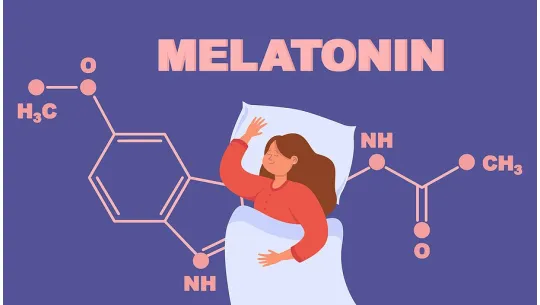Melatonin - the hormone of sleep and calmness

Sleep plays a crucial role in human health. During sleep, our body recovers and regenerates. In addition, sleep helps improve memory, concentration, and mood, while also reducing stress and supporting overall well-being. That is why it is important to ensure sufficient, high-quality sleep. Melatonin can help us with this.
What is Melatonin?
Melatonin is a hormone produced by the pineal gland in the human brain. It plays an important role in regulating the body’s circadian rhythms, such as sleep and wake cycles. Melatonin is secreted in darkness and suppressed by light, which means its level rises at night and decreases during the day. It also has antioxidant properties and may help protect the body’s cells from damage caused by free radicals.
Functions of Melatonin in the Body
Regulation of circadian rhythms
Circadian rhythms are biological processes that occur in a 24-hour cycle, including sleep and wakefulness, hormone production, body temperature, and more. Melatonin helps the body prepare for sleep and improves its quality.
Protection of cells from free radicals
Melatonin is a powerful antioxidant that protects cells from oxidative damage and improves cellular function. This may help prevent the development of various diseases such as cancer, heart disease, and diabetes.
Regulation of the immune system
Melatonin strengthens the immune system and protects the body against infections and illnesses. It activates immune cells such as lymphocytes and natural killer cells that fight infections and tumors. In addition, melatonin reduces inflammation in the body, which further supports immunity.
Stress management
Melatonin may help manage stress as it influences stress-related hormones such as cortisol. When melatonin levels rise, cortisol levels decrease, which can help reduce stress and improve mood.
Positive impact on the cardiovascular system
Thanks to its antioxidant properties, melatonin helps protect the heart muscle from oxidative damage. It may also help lower blood cholesterol levels, reducing the risk of cardiovascular diseases such as atherosclerosis and heart attack.
How to Increase Melatonin Levels Naturally?
Follow a healthy lifestyle. Regular sleep is key—melatonin is mainly produced in darkness, so it’s important to sleep in a dark room and go to bed at the same time each night.
Avoid bright light before bedtime. Strong light suppresses melatonin production, so avoid bright screens from phones, tablets, and computers before sleep.
Support melatonin production with nutrition. Foods such as nuts, bananas, kiwi, and dark chocolate can stimulate melatonin synthesis.
Stay physically active. Regular exercise improves sleep quality and naturally boosts melatonin levels. For athletes, it can also help recovery after training.
Consider dietary supplements. Melatonin supplements can safely restore melatonin levels without causing dependence or overdose. They may improve sleep quality and support overall health.










